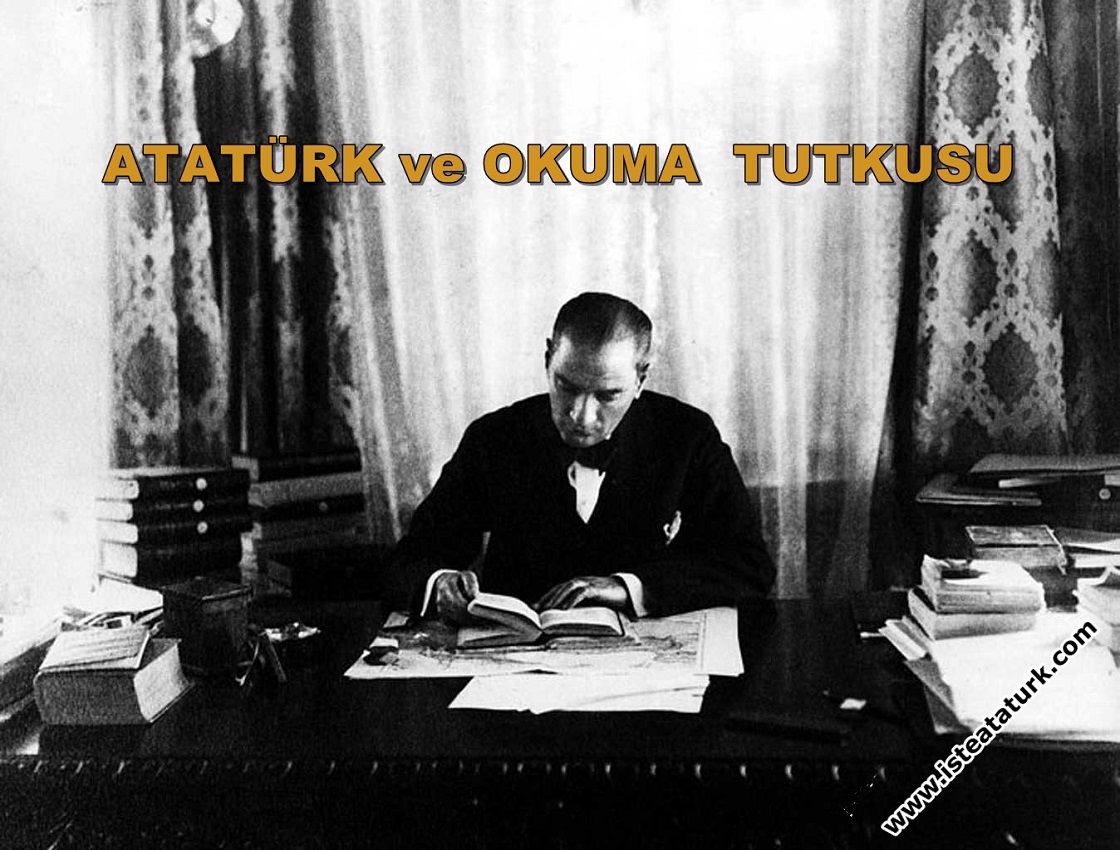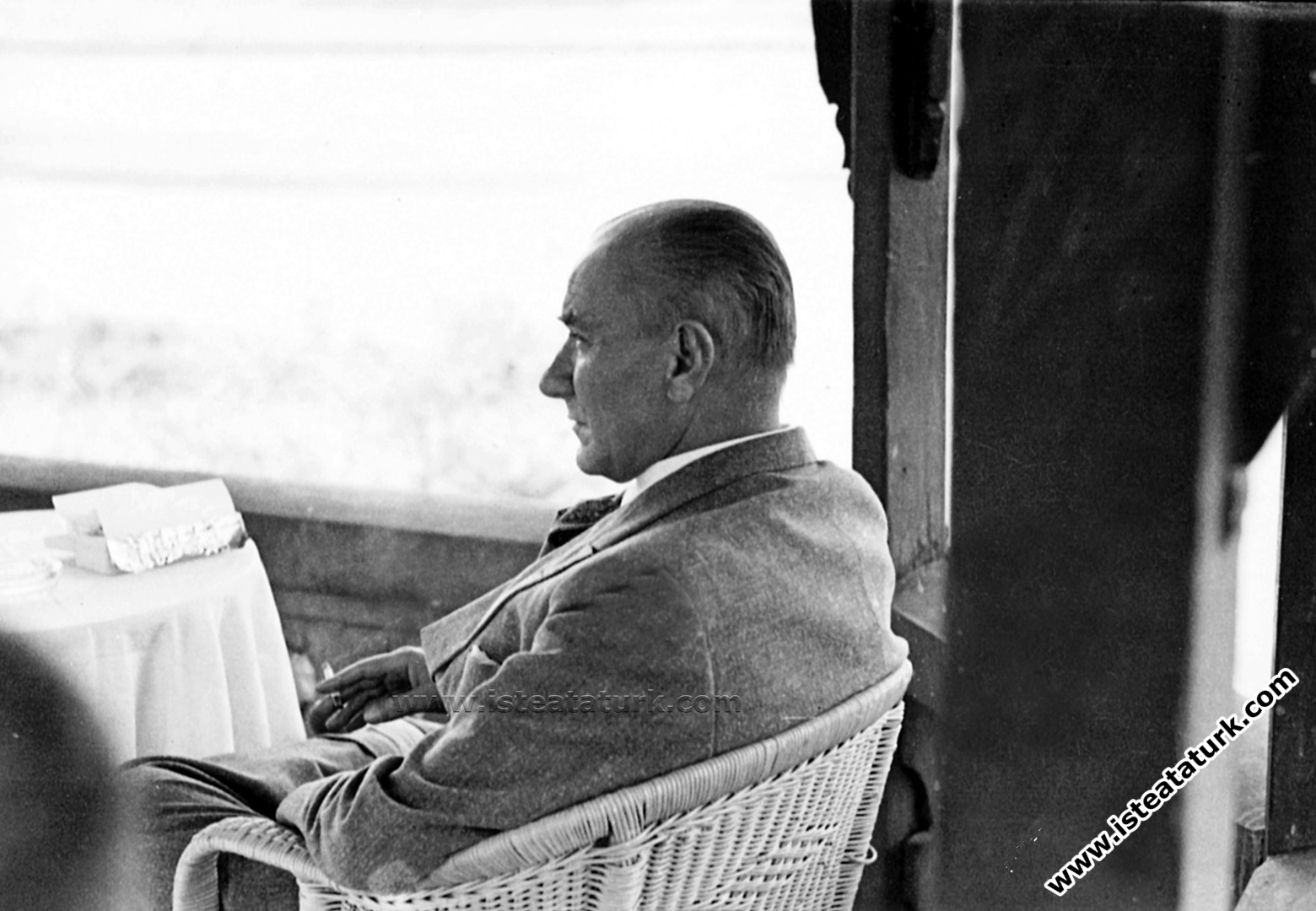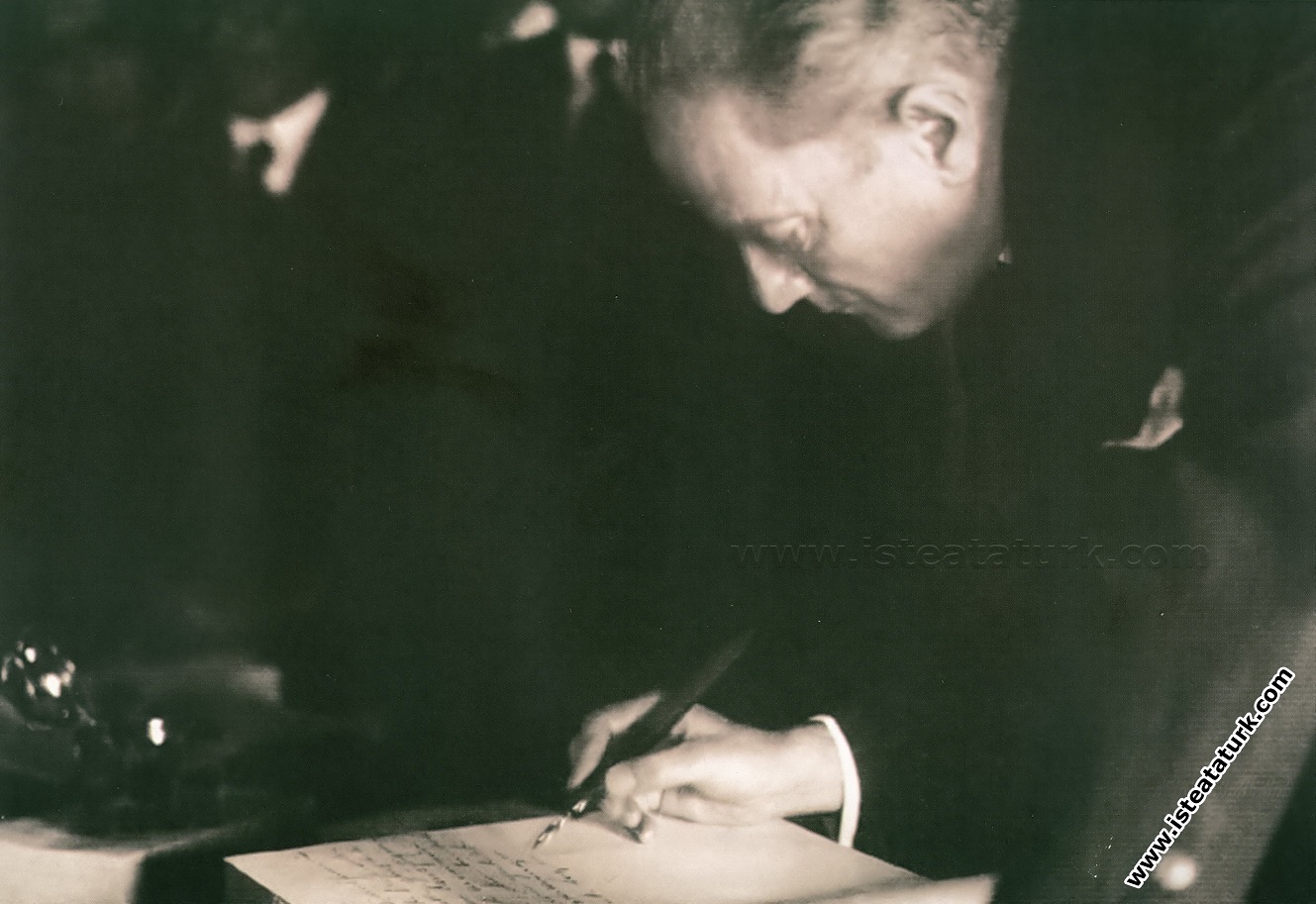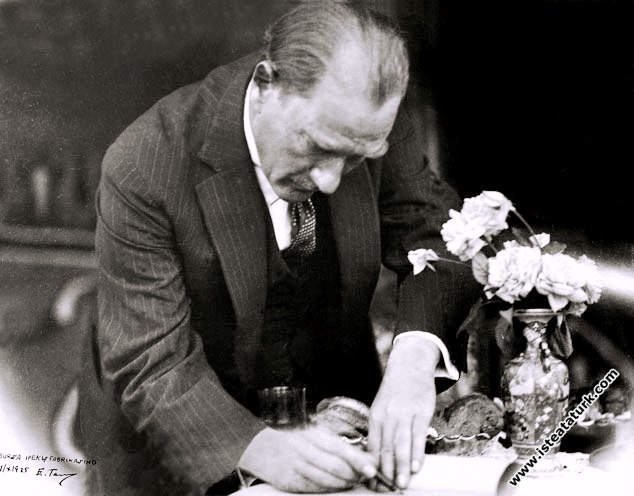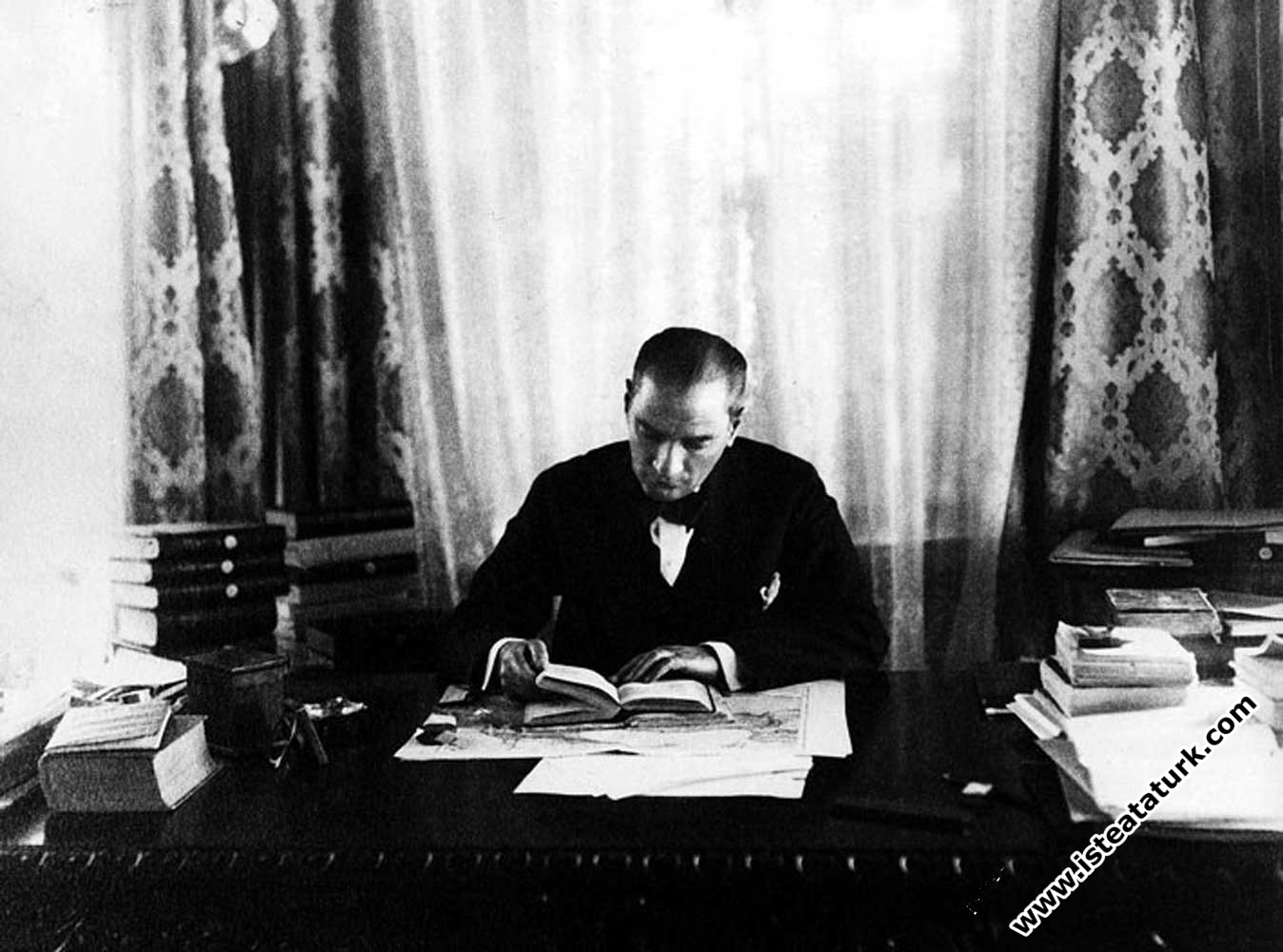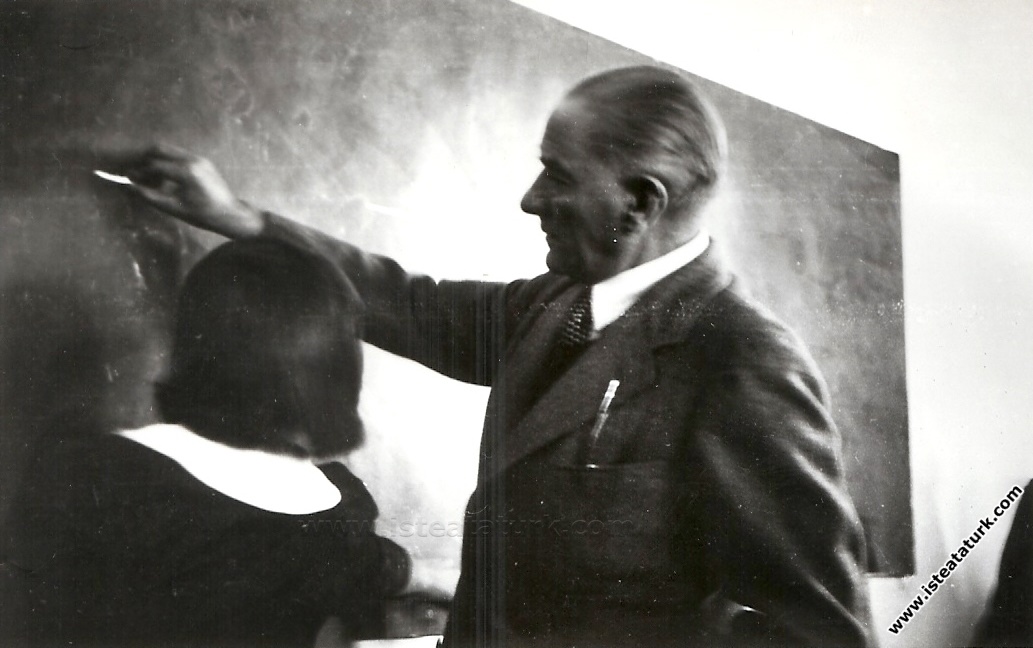
Atatürk as an Education Leader
Character Size
Atatürk as an Education Leader
ATATÜRK AS AN EDUCATIONAL LEADER
As an education leader, Atatürk correctly identified the errors and disruptions in education and, according to him, carried out the radical changes that were the solution in the education system by himself.
Before examining Atatürk's educational leadership, it is necessary to look at what education and educational leadership are.
PART I
EDUCATION AND EDUCATION LEADERSHIP
1.1. WHAT IS EDUCATION?
Education is a vital need of people like bread and water. We can say that it is not possible.
A person is born alone, but opens his eyes to the world in society and continues his life in a group until he dies.
From birth to death, he interacts with the groups he is in. It is under the influence of an indirect-direct, intentional-unintentional education. In this sense, education is subject to education not only in school but also in family, friend group, street, mosque, military service... in every environment and at every stage of life. People are affected and affected.
It is a process that starts in the womb and continues until the grave. We can learn a new knowledge, skill, behavior at any time, or our existing knowledge, skills and behavior can change at any time and at any time.1
According to various authors, the definition of education is different.
Education, in general terms, is the process of educating people for certain purposes; In a broad sense, it is a part of the process of adopting the existing culture in the society to the individual.2
It is a planned set of effects that serve to bring about certain improvements in people's behavior according to predetermined principles.3
It is the process of deliberately bringing about a desired change in an individual's behavior through his or her own experience.4
Education is the process of changing behavior in the individual.5
According to these definitions, the elements of education are;
a- Being a tool in transferring the existing culture in the society, adopting it and developing it
b- It means creating a new behavior in the individual and changing the existing one.
Education also fulfills many functions.
a- It enables the individual to be a member of the society in which he lives.
b- It is the driving force that raises the need for qualified manpower, which is the basis of economic and social development.
c- It is an effective tool for the individual's self-realization, which is the ultimate goal, by enabling the individual to grow up to the extent of his/her abilities and abilities.
d- It is an indispensable tool in ensuring the continuity of society by educating citizens who adopt common values, beliefs, culture and political regime.
TRAINING REQUIREMENT
Many of an individual's behavior is the product of learning. In order for a behavior to be considered a learning product:
- The individual has subsequently won,
- It should at least begin to show with a certain determination. 6
Education is a fine art because its material is human. Training should be done by knowledgeable people with a suitable program, equipment, method and also with special attention and care.
Education is a process that bears fruit late. We know that those who have a say in today's society are the product of educational practices 20-30 years ago. In this sense, it is necessary to start raising the desired quality of people of the future now. 7 As the famous Chinese philosopher Kuan Tzu said
“A year from now, what you're thinking about is planting seeds; Plant a tree, ten years later, what you design; But if you think a hundred years ahead, educate the people then;
Once you sow a seed, you will get a crop once; If you plant a tree once, produce ten times, educate the nation;
If you give someone a fish, they will be satisfied for once; Teach you how to fish, you'll be satisfied for the rest of your life."
Education is a rapidly developing technology today. With this technology, new generations, which means the future of societies, are being raised.
Education is an event and phenomenon that happens everywhere at any time. There is no place and time.
If:
- If educational activities are not well planned,
- If individuals are randomly trained in their environment,
- There are few or no good educational examples around them,
- If the education given to individuals is not scientific in terms of goals, programs, tools and methods; Worse than not achieving goals, unwanted type of people will be able to show up in society.
Based on all these, we can express the necessity of education as follows;
1- Transferring and adopting the existing culture in the society to new individuals,
2- Raising citizens who share common values that will ensure the continuity of the society, are integrated, tolerant towards each other, adopt a democratic lifestyle and can show this as a behavior,
3- Raising the need for qualified manpower, which is the dominant force in social and economic development, in the required fields and in numbers,
Education is necessary in every society and at every stage of the individual's dream so that the individual can realize himself, which is the ultimate goal, by raising him in line with the interests and abilities of the individual.
If the individuals who make up the society are required to display desired behaviors at every stage from birth to death, the education they are subject to should not be left to chance; it must be planned and its mistakes and deficiencies must be corrected and it must be put to work again.8
TYPES OF EDUCATION
Formal education is the education given regularly under the roof of the school, with programs prepared according to the purpose, for individuals in a certain age group and at the same level. In this type of education, general, vocational and technical education programs are applied.
Non-formal education is the education given to individuals who have never entered the formal education system, who are at any level or who have left one of these levels, in the fields they need. This training is given to individuals in different age groups and levels in the environment and time required by the programs prepared in accordance with their purposes. Public education, adult education, adult education, pre-service vocational education and in-service training are non-formal education.9
1.2. EDUCATION LEADERSHIP
The school is expected to train and lead leaders. The leaders that the school has trained, the leaders that it has not been able to train, and the subjects it leads are constantly criticized.
In education, leadership is always expected from the administrator at every level, the supervisor of every level, the teacher of the class for every lesson, and the student from time to time. 10
UNIQUE FEATURES OF THE SCHOOL AS AN ORGANIZATION
We can list the unique characteristics of the school as an organization as follows.
1- The raw material on which he works is the human that comes from the society and goes to the society.
2- There are various values. These values interact and conflict with each other.
3- He has difficulty in evaluating his product.
4- It is a special environment.
5- All the formal and natural organizations around it try to direct or influence the school.
6- It is tried to classify the independence of opinion.
7- It ensures the transfer and change of culture.
8- It is a bureaucratic institution.
9- Since it has a unique personality, the organizational atmosphere of each school is different.
LEADERSHIP IN EDUCATION
Leadership in education manifests itself with authority, duty, execution and influence. The expectations of the members in an educational organization can be considered as a response to leadership in management. The behaviors that these members expect from the manager have an important place in the structure and atmosphere of the organization.
Today's educational leaders must first of all be knowledgeable and versatile. A leader manager is a person who can distinguish between what an education initiative is and what it should be, and who can use the material and human resources under his responsibility in the second direction. 12
Development in education is a leadership issue. Conservative educational organizations do not accept the initiative to train leader administrators.
CHAPTER II
ATATÜRK'S EDUCATION LEADERSHIP
We see Atatürk's educational leadership in making correct observations and determinations about education, bringing principles about education, realizing radical changes, being an instructive personality and an education practitioner.
2.1. MAKING THE CORRECT OBSERVATIONS AND DETECTIONS REGARDING OUR EDUCATION
One of the most important characteristics of the leader is to identify and define the existing problems by making a good observation and analysis. Since his youth, Atatürk has viewed the education system of our society with a critical eye, and his observations and diagnoses have shed light on the radical changes he plans to make in the field of education in the future.14
Atatürk made correct observations and determinations about our education, saw the basic mistakes of our education and showed it to our nation.
THERE IS A WIDE IGNORANCE IN OUR SOCIETY
Atatürk's observations about ignorance are as follows.15
“The greatest enemy that has made our nation a tool for the greed and exploitation of others for centuries is ignorance. It is this ignorance that has not made the nation possess its own identity for centuries and has kept the nation careless for centuries. It is thanks to being able to benefit from this ignorance of the nation that the rulers use the nation like slaves and slaves, and consider all lands as their own lands. If we want true salvation, we must first of all destroy this ignorance with all our strength, with all our image. Here, we do not take ignorance only in the sense of reading and writing.”
OUR EDUCATIONAL - TEACHING METHODS ARE NOT SUITABLE
Atatürk personally experienced the passive-active, rote-experimenter education methods based on pressure-partly freedom in his student life; He has studied and observed how Turkish children and young people have been brought up for centuries and what kind of results this has given. After all these experiences, observations and examinations, he made one of the most important diagnoses in the history of Turkish education in front of our teachers at the Education Congress convened in Ankara in July 1921.16
“I am of the opinion that the education and training methods followed so far are the most important reason in the history of our nation's decline.”
THERE IS FAMILY PRESSURE ON OUR CHILDREN
Atatürk also draws the attention of parents to a wrong attitude of parents about children. 17
“Most families have always had a bad habit: they don't let their children speak and they don't listen. What a wrong, even harmful move.”
OUR EDUCATION SYSTEM IS NOT NATIONAL
According to Atatürk, the rise or fall of a nation is related to whether the education system is national or not. Our non-national education system is one of the main causes of our centuries-long disasters. In the speech he made with the teachers in Samsun in September 1924, he made the following very important diagnosis and determination.18
“It is decency that either makes a nation live as a free, independent, glorious, high society or leaves a nation to slavery and poverty.”
WE DO NOT HAVE A STABLE EDUCATION POLICY
Atatürk made the following diagnosis and determination in 1923 for the last periods of Ottoman education. 19
“Each Minister of Education and Deputy had a program. Because of the implementation of various programs in the education of the country, teaching has become terrible.”
THE PURPOSE OF OUR EDUCATION WAS RAISING CONSUMER PEOPLE
After Atatürk said that every minister had a different program implemented, he stated that the aim of our education is to raise consumer people who do not know themselves and life and have superficial knowledge on every subject. 20
“What did all these practices and programs give? A team of people who knew a lot, learned a lot... But what did they know? He knew some theory! But what did he not know? He could not know himself, my dear, did not know his need and was hungry! It can be said that as a lucky result of this education style, being an intellectual in the country means knowing a lot, being condemned to misery and poverty.”
2.2. RESOLVING PROBLEMS IN THE LIGHT OF “EDUCATIONAL PRINCIPLES”
Atatürk proposed solutions to the problems he posed as a result of his observations and diagnoses, in the light of the "educational principles" he put forward, and shaped his national tendency policy.
The educational principles that Atatürk put forward in solving current education problems and shaping future educational practices are as follows. 21
- Education should be secular.
- Education should be national.
- Education should be mixed.
- Education should be scientific.
- Training should be practical.
While determining these principles, it is self-evident what kind of Turkish people Atatürk wanted. He knew that education was the foremost element in the transition from an ummatist understanding of society to Turkish nationalism, and from an understanding of subjects to an order based on the sovereignty of the people. 22
Among the characteristics of the leader are diagnosing and defining problems, as well as offering appropriate solutions. Atatürk's solutions to educational problems were modern, rational, national, scientific and applicable. This shows how well Atatürk, as a leader, also knew the Turkish nation. Atatürk's suggestions for solutions to educational problems have been the basis for practices and an example for the future. 23
EDUCATION MUST BE SECULAR
In 1923, three-quarters of the trend in Anatolia was still under the umbrella of madrasahs. Atatürk had great difficulty in finding the trained staff he needed in the field of education and in other fields. 24
Some time after the abolition of madrasas. During his trip to Rize, a missing person applied to Atatürk with a petition and asked for the madrasahs to be reopened. After explaining the inadequacy of the madrasa education and its role in the disaster in the country to this delegation, Atatürk concluded his speech as follows. 25
“You don't want a school. However, people want it. Let this poor nation grow up, the son of this country. Madrasahs will not be opened… The nation needs a letter.”
EDUCATION MUST BE NATIONAL
Considering the non-national education of previous periods among the main causes of our disasters, Atatürk wanted the new state's education to be national. In a speech he gave to the youth of Konya in March 1923, he tried to explain what "national education" was. 26
“Our intellectuals say, “Let me make our nation the happiest nation”. He says, "Let's do it exactly as other nations have done." However, we must consider that such a theory has never been successful in any era. What is bliss for one nation can be a disaster for another. The same reasons and conditions may make one happy but the other miserable. That's why, while showing this nation the way to go, let's make use of all kinds of science, inventions and progress of the world. But let's not forget that we have to extract the real foundation from within ourselves.
EDUCATION MUST BE COMBINED
In the speech he gave while opening the Turkish Grand National Assembly on March 1, 1923, he gave clear directives on the unity of education. 27
“There are sciences and sciences that the children of the country are obliged to acquire equally and jointly. “Unity in education and training” is very important for the progress and advancement of our society, until we reach the degrees of education where higher professionals and specialists can leave.”
EDUCATION MUST BE SCIENTIFIC
Atatürk said that science should be the only guide for us in education, as in every field, and opened a new era in our education history. He expressed this in his Tenth Anniversary Speech: 28
“The torch that the Turkish nation holds in its hands and minds on the path of civilization and progress on which it is walking is positive science.
EDUCATION MUST BE PRACTICAL
Education should produce useful, productive and successful people in life. Atatürk saw that the professions that were in demand during the stagnation and regression periods of the Ottoman Empire were civil servants and therefore trade and industry were left to Greeks, Armenians and Jews; has tried to remove the excessive fondness of being civil servants, which is one of the most important reasons of our decline, and has aimed to raise a new and active human type in our education. In 1931 he says: 29
Primary and secondary education should definitely give the science and technique required by humanity and civilization, but in such a practical way that the child will be sure that he is not condemned to starvation when he leaves school.”
2.3. MADE FRAMEWORK CHANGES IN EDUCATION
A leader is someone who can show new structures and behaviors. Atatürk created a new structure and behavior with his reforms in the field of education, and the practices until that day have completely changed. Secular education instead of religious education; Using Latin Turkish letters instead of Arabic letters; to show positive science instead of metaphysics; The Turkish language should be purified from Arabic and Persian; Turkish history has begun to be revealed with its real aspects. 30
LOCALIZATION OF EDUCATION
In his speech at the Grand National Assembly of Turkey on March 1, 1922, even during the years of the War of Independence, Atatürk demanded that national education be harmonized with our nation's current state, social and vital needs, environmental conditions, and the necessities of the century we live in.31
On March 3, 1924, together with the law of “abolishing the caliphate”, the law of “Tevhid-i Tedrisat (unification of education)” was accepted, and with this law, the madrasas were first transferred to the Ministry of National Education and then closed. Atatürk emphasized the importance he attached to the unity of education and training in the following speech he made during a country tour after the adoption of the law of “Unification of Education”. 32
“Unless we combine education and training, would it not be futile to seek the opportunity to build a nation made up of individuals with the same mindset? The Turkish nation, worthy of being the owner of a place that is respected in the world civilization family, could not bear to divide the education it will give to its children into "two kinds of institutions" completely different from each other, called "school" and "medrese"?
After a while, the “first parts” of foreign schools in Turkey were closed. Thus, the principle that all Turkish children should go through the "compulsory primary education" applying the same program was strengthened. The principle of teaching "Turkish, history, geography and civics lessons" in "Turkish" by "Turkish teachers" was accepted in the "middle" parts of minority schools and foreign schools. This was an important step towards the unity of education.
TO REPLACE ARABIC LETTERS WITH TURKISH LATIN LETTERS
In the years when the republic was founded, 90% of the population was illiterate. Our linguist explained the reason for this as follows. 33
“Before the Republic, more than ninety percent of the population was illiterate. The reason was the difficulty of reading and writing with the old script. Old writing was power; because it was the writing of Arabic; He was not suitable for writing Turkish. We took the Arabic alphabet and added only the letters "p,ç,j" which are not found in Arabic. But we would not have formed the alphabet of Turkish with this.”
According to Atatürk, Arabic letters should have been abandoned for the following reasons:34
1- It was not suitable for Turkish.
2- It is difficult to learn, which is a reason for the low level of education in the society.
Atatürk says in August 1928:
“It is a shame if 10%, 20% of a society can read and write and 80% and 90% are illiterate. As a human being, we should be ashamed of this. However, this nation did not come to be ashamed.”
On November 1, 1928, the new Latin Turkish Alphabet was adopted by law.
The alphabet revolution, besides enabling large masses of people to become literate quickly. It aimed to liberate Turkish language and culture from the influence of Arab and eastern culture.35
BRINGING A NEW UNDERSTANDING OF HISTORY
Opposing the Ottoman understanding of history, he argued that the Turks had a history and civilization of thousands of years, and especially focused on the periods before their conversion to Islam.
The aim of all these efforts is the history of both westerners. The aim was to instill a deep-rooted sense of trust in the Turkish people, to whom he had unjustly attacked in terms of race and civilization, and also to encourage scientists for new research. 36
Atatürk established the Turkish Historical Society for this purpose in 1931.
SYSTEMIZING ITS WORK TO SIMPLIFY AND DEVELOP TURKISH
II. In the Second Constitutional Era, a rapid simplification took place in the language with the effect of the Turkism movement that was getting stronger. However, the number of words from other languages was still high in Turkish.
Atatürk established the Turkish Language Institution in 1932 in order to accelerate the simplification of the language and to make it permanent and to enable scientific research on Turkish.
CHAPTER III
CONCLUSION
Atatürk's observations, diagnoses, recommendations and orders regarding the education system show his personal leadership.
His education, practice and reforms in the field of education show his situational leadership.
Atatürk is the leader of both theory and practice in education.
Atatürk was a leader who could distinguish between what an education initiative was and what it should be, and who could use the material and human resources under his responsibility in the second direction.
He has placed the awareness that "going above the level of contemporary civilization" will be through education.
All of these make Atatürk's educational leadership up-to-date.
RESOURCES
Açıkalın, Şule Educational Leadership Lecture Notes Ankara: Hacettepe University, 1992
ADEM, Mahmut Our National Education Policy and Financing Ankara: A.Ü. Faculty of Educational Sciences Publications, No: 172, 1993
Our Education Policy in the Light of Kemalist Thought Education Policy Ankara: 1995
AKSOY, What is the Importance of Ömer Asım Atatürk's Concept of Populism in Education? Turkish Education Association V. Education Meeting, Ankara 4-6, 11
1981 Atatürk and Education Ankara: TED Publication, No:5, 1981
AKYÜZ, Yahya Türk Educational History (From the Beginning to 1993) İstanbul: Kültür Koleji Publications Searching in Education Series: 4, 1994
BURSALIOĞLU, Ziya New Structure and Behavior in School Management Ankara PEGEM. No:2, 1992
VIRTUE. Ali consent. The Necessity of Education Education in the Information Age. Year:3, Issue:6, January-February-March 1996
An Educational Leader Atatürk (Educational Leadership Lecture Paper) Ankara: Hacettepe University, January 1993
ERTÜRK, Selahattin. Curriculum Development in Education Ankara: Yelkentepe Publications, 1972
FEYZİOGLU, Turhan and Others Atatürk Road Ankara: Atatürk Research Center Publication, 1987
FIDAN, Nurettin. ERDEN, Münire Introduction to Educational Science Ankara: Repa Publications, 1989.
OGUZKAN, Ferhan. Dictionary of Education Terms Ankara. Turkish Language Association Publication, 1974.
ÖZCAN, Demirel Dictionary of Education Terms. Ankara: Usem Publications No: 10.1993
ÖZÇELİK, Durmus Ali. Curriculum and Instruction Ankara: OSYM Publications, No: 8, 1989
TAYMAZ, Haydar. In-Service Training Ankara: Pegem Publications No:3, 1993
1 Ali Riza Erdem. The Necessity of Education, Education in the Information Age, Year:3, Argument:6, January-February-March 1996, p.9
2 Nurettin Fidan, Münire Erden Introduction to Educational Science Ankara: Repa Publications, 1989, p. 5
3 Ferhan Oğuzkan Dictionary of Educational Terms Ankara: Turkish Language Institution, 1974. p. 6
4 Şelahattin Ertürk Curriculum Development in Education Ankara: Yelkentepe Publications, 1972. p. 12
5 Özcan Demirci Dictionary of Education Terms Ankara: Usem Publications, No: 10. 1993. p.36
6 Durmuş Ali Özçelik, Curriculum and Instruction Ankara. OSYM Publications. No: 8. 1989.
7 Virtue: agms 10
8 a.g.m. s. 10
9 Haydar Taymaz In-Service Training Ankara: PEGEM Published. No:3, 1993. p.3
10 Şule Açıkalın Educational Leadership Lecture Notes Ankara: Hacettepe University 1992. p. 11th
11 Ziya Bursalioglu. New Structure and Behavior in School Orientation Ankara: PEGEM. No:2, p.32-35
12 a.g.e.. s. 191
13 a.g.e.. s. 191
14 Ali Riza Erdem. Atatürk, an Educational Leader (Leadership Coursework) Ankara: Hacettepe University, January 1993. p.4
15 Yahya Akyüz Turkish Education History (From the Beginning to 1993) İstanbul Kültür College Publications Searching in Education Series: 4, 1994, p. 290
16 A.g.e., s. 291
17 A.g.e., s. 291
18 A.g.e, s. 291
19 A.g.e., s. 292
20 A.g.e., s. 292
21 Mahmut Adem, Our National Education Policy and Financing Ankara: A. U Faculty of Educational Sciences Publications. No: 172, 1993. p 25
22 Adem, Our Education Policy in the Light of Kemalist Thought Education Policy Ankara: 1995. p 77
23 Virtue. An Education Leaders Atatürk. S . 5
24 Turhan Feyzioğlu and Others Atatürk Road Ankara: Atatürk Research Center. 1987, p.47
25 Age. Atatürk 1000 Fundamental Works from p 205. Istanbul: 1970. p.218
26 Akyüz ages 94
Atatürk's Discourses and Statements from 27 Feyzioğlu ibid., p.204, vol. Second Edition. p.300
28 Akyüz ibid. p.295
29 A.g.e., s. 295
30 Erdem, An Educational Leader: Atatürk, p.6
31 Feyzioglu. Ataturk's Discourses and Statements from ages203, c. II. Second Edition, p. 16
Atatürk 1000 Fundamental WORKS from 32 Ibid. 205. Istanbul. 1970, p.217
33 Omer Asim Aksoy. What is the Importance of Atatürk's Populism in the Trend?'' Turkish Education Association V. Educational Meeting. Ankara: 4-6.11
1981 Atatürk and Education Ankara: TED Publication, No: 5, 1981, p. 91
34 Akyüz Ibid., p. 298
35 Adam. Our National Education Policy and Financing p. 11th
36 Akyüz Age, p. 299
Teacher Menendi Erdem
Source: ATATÜRK ARAŞTIRMA MERKEZİ DERGİSİ, Sayı 40, Cilt: XIV, Mart 1998
